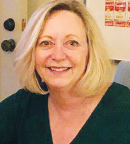I have been a radiologic technologist for 47 years, so after going to the bathroom one Sunday morning in October 2018 and finding my urine had suddenly turned dark, I knew something was wrong. I wasn’t in any pain and did not have a urinary tract infection, which would explain the discoloration of my urine. I knew this wasn’t something I could ignore, so I acted quickly.

Marsha Edwards
Within a couple of days, I had sent a urine sample for testing to my primary care physician, who suspected I might have a kidney stone in the common bile duct or liver. An endoscopic ultrasound of my pancreas, bile duct, and digestive tract found that my common bile duct was two and half times its normal size and my pancreatic duct was slightly dilated. By now, I was also severely jaundiced. Subsequent magnetic resonance cholangiopancreatography and computed tomography imaging scans zeroed in on the problem. I had a tumor about 2.5 cm in diameter sitting on the head of my pancreas, butted up against the common bile duct.
As soon as the images appeared on the screen, I knew—and the physicians examining the film knew—I had pancreatic cancer. I had a total meltdown. During my long medical career, the two cancers that frighten me the most are pancreatic and ovarian, because I know these are two diseases usually diagnosed in more advanced stages, when cure is less likely. It was the only time since my
diagnosis that I cried.
Cancer-Free and Cautiously Optimistic
The surgeon I met with assured me that, because the tumor was small, had favorable biologic features, and was confined to the top of the pancreas, even though the cancer was being treated as stage III—I think the official stage of the tumor was IIa—my prognosis was good. He suggested I first undergo chemotherapy to shrink the tumor and then surgical resection to increase my chances for a cure. However, I said I wanted to reverse the course of the treatment plan and have the surgery first to get rid of the tumor and then adjuvant chemotherapy to kill any remaining malignant cells, and he agreed.
I underwent a pancreaticoduodenectomy, which removed two-thirds of my pancreas and part of my stomach and small intestine. My gallbladder had been removed decades before, which saved me about 2 hours in the operating room. I then underwent 7 months of a grueling combination chemotherapy regimen of FOLFIRINOX
(fluorouracil, leucovorin, irinotecan, and oxaliplatin), which knocked me out, but I got through it.
As of today, I am cancer-free, but I know my status can change at any moment. I’m aware that the 5-year survival rate for my stage of pancreatic cancer is a dismal 12%,1 but I refuse to have an expiration date. I have follow-up visits with my oncologist every 3 months to look for signs of recurrence. In between those visits, I try to live my life as normally as possible.
Living Life in the Present
When I was recovering in the hospital from surgery, I had a horrific fear of dying, but not anymore. I’m learning to live one day at a time, and, some days, I don’t even think about cancer. But I don’t take anything for granted.
“I am fortunate to have the full support of my amazing medical team and am so appreciative of the excellent care I continue to receive from my oncologist and nurse practitioners.”— Marsha Edwards
Tweet this quote
When you are told you have cancer, your life changes in a minute. But I have always had the mindset that I can beat this disease, and that’s how I’ve gotten through the last year and a half, with good humor and grace.
I am fortunate to have the full support of my amazing medical team and am so appreciative of the excellent care I continue to receive from my oncologist and nurse practitioners. I’m also grateful to my family, friends, and coworkers, who give me their unconditional love every day. I know how privileged I am to have such caring people in my life.
Over the past 4 decades, I’ve seen many advances in cancer diagnostics and treatment, which have resulted in saving the lives of millions of people diagnosed with cancer. I’m hoping that an effective screening strategy for pancreatic cancer, perhaps a simple blood test for the early detection of tumor markers associated with the disease, will be available soon, so more patients with this lethal cancer will have the chance for a cure.
I know I’m not out of the woods yet, but I refuse to live my life with a time limit, and I remain optimistic. It is the only way I can survive and thrive.
REFERENCE
1. American Cancer Society: Survival rates for pancreatic cancer. Available at www.cancer.org/cancer/pancreatic-cancer/detection-diagnosis-staging/survival-rates.html. Accessed March 19, 2020.
Ms. Edwards is a retired radiologic technologist, living in Grove City, Ohio.
Editor’s Note: Columns in the Patient’s Corner are based solely on information The ASCO Post received from patients and should be considered anecdotal.

